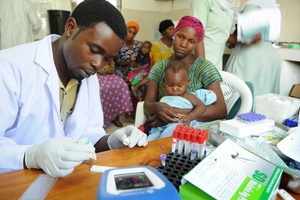In Africa’s largest country, the coronavirus pandemic has sharpened the spotlight on a health-care investment deficit and international investors are attempting to fill the gap.
African health-care assets had started to build concern more widely, long before the pandemic. In November 2019, the World Bank’s International Finance Corporation joined with the Investment Fund for Health in Africa-II (IFHA-II) to form a $115 million purchase platform for healthcare provider providers in the east and south of the continent.
After the advent of the pandemic, 100 billion naira ($254.6 million) have been released by the Nigerian government in state credit facilities for healthcare, from pharmaceutical firms and suppliers of drugs to service providers, which has evidently sparked greater demand from private investors. A further 50 billion naira is supplied by the Bank of Business, a Nigerian infrastructure finance agency.
“The construction of world-class healthcare facilities across Africa, but particularly in Nigeria, is a very compelling opportunity,” said Hafeez Giwa, managing partner at HC Capital Properties, which has started to invest in health-care assets in Nigeria.
Another potential was outlined by Tosin Runsewe, CEO of healthcare investment company AfyACare Nigeria: mandatory health benefits for federal workers would decrease insurance premiums and the amount of healthcare costs covered could increase to between 20 percent and 30 percent by 2030.
The Knight Frank study emphasised that, as it is, about 72 percent of household health care spending is out-of-pocket, relative to the sub-Saharan average of 35 percent, and just 5 percent of health care is provided by insurance.
Runsewe said, “The cost of this treatment could be met by a health insurance premium of just around 20,000 Naira ($50) per year, half of the current average cost, if we were able to reach a critical mass of 40 million to 60 million Nigerians covered by healthcare.”
“In private primary health centres, there are a number of ways for investors to provide coverage at an affordable cost.”
Due to both “extreme need” and government policies that have made it easier to grow high-quality assets that provide affordable care, Giwa said HC Capital Properties was investing in Nigeria. He indicated that these prospects are actually being pursued by two forms of investors.
Giwa said, “In the one hand, there are local foreign investors and local pension funds who, in the case of Nigeria, are investors in Naira and have no currency risk concerns.” “On the other hand, companies and institutions are intrigued about the possibility of offering high-quality healthcare to Nigerians with lower and middle incomes.”
He believes the pandemic to have led to a “permanent change in thinking” that would bring more emphasis on better health care at home. According to a recent PwC survey, Nigeria currently loses up to $1 billion per year to outbound health tourism among wealthy Nigerians due to insufficient domestic access.

